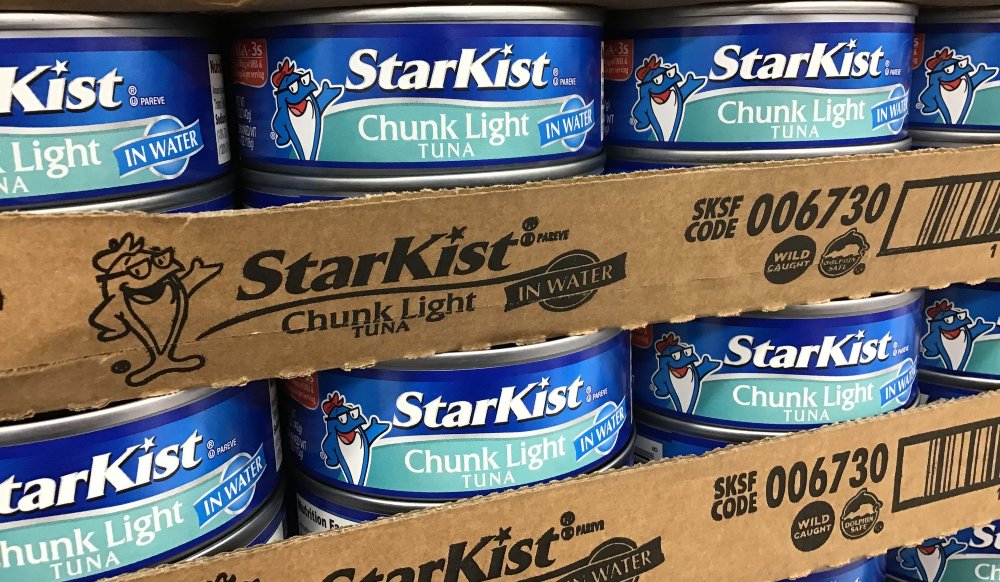If you bought a can of tuna or chicken over the last decade, you could have a check in your future, courtesy of some corporate skullduggery.
This has to do with antitrust lawsuits that Attorney General Bob Ferguson filed against a flock of chicken and tuna giants — Tyson Foods, Foster Farms, and StarKist included — arguing they were making bank on a price-fixing scheme. Long story short, Ferguson’s office managed to squeeze $40.6 million from Big Tuna and the majority of Big Chicken players in the 2020 lawsuit.
In yet another example of why the attorney general’s office is a great place to be if you’re running for governor, Ferguson used fishy visual aids this past week to announce that money is on its way to 402,200 low-income Washington households whom the AG’s office determined paid the most for the sins of Big Tuna and Big Chicken. For instance, that can of chunk light tuna that set you back $1 way back in 2013 went for $1.08 under the price scheme.
Since few of us likely kept our grocery receipts from when Edward Snowden still had a job at the NSA, the AG’s office is mailing checks to affected Washingtonians using income data in place of a time-sucking claims system. Ferguson stressed at Tuesday’s press junket that there’s nothing anyone needs to do to get their check.
Said checks will get mailed to some 1.2 million Washingtonians living at or below 175 percent of the federal poverty level. Single-person households will net $50, while multi-person households are owed $120.
Ferguson said on Tuesday the first round of checks was mailed on Tuesday and the last of them should arrive before Dec. 31. He urged folks to hang tight until New Year’s to blow up the phone lines if they don’t see a check in the mail. You can file such a claim at refundcheck.atg.wa.gov from January through June 2024.
FYI, those checks should arrive in envelopes from the Attorney General’s Office that look like this:

To that end, Ferguson said another $1.7 million in Big Tuna/Big Chicken dollars is being set aside in case anyone got overlooked.
A trial against the last three accused co-conspirators is slated for October 2024: Foster Farms, Wayne-Sanderson Farms, and House of Raeford Farms. (Wayne Farms and Sanderson Farms merged after the lawsuit was filed.) Should those aforementioned companies pay up, expect a few more checks to flood mailboxes in the years to come.
A bid to rein in gift-card profiteering
Lawmakers unwrapped a proposal last Monday to thwart big retailers from padding profit margins with those unspent gift cards lost between your couch cushions.
The idea was unveiled per a giving-season news conference and would plug a 20-year loophole allowing big retailers to make bank from unspent and unclaimed gift card credit without paying a single dime in goods or services.
Here’s how this works. Say your friend at the office, Bob, has a birthday coming up. You buy him a $25 Starbucks gift card. Bob spends $23.45 worth of said gift card, earning two stars in his rewards account to boot. Bob isn’t typically the type who gets his cup of morning joe from Starbucks because the java at the office is heavenly, so he never redeems those two stars. Now Starbucks has cash in Bob’s account that becomes pure profit when those stars expire.
That all adds up for Starbucks, which raked in $215 million in profit from unused gift card cash in 2022. Starbucks is just one player gaming unspent gift cards here, but the java giant and Seattle-based Nordstrom tower over their competition in this field. (Nordstrom finished 2022 with the second-biggest unredeemed gift card cash pile of about $40 million.)
Thirteen states including California have penned laws banning high minimums for gift cards and mobile app reloads on top of allowing consumers to cash out paltry gift card balances. Amazon, Walmart, and a wealth of other Fortune 500 companies do surrender their stacks of unspent gift card cash to state coffers.
Rep. Emily Alvarado, D-Seattle, and Sen. Yasmin Trudeau, D-Tacoma, argued at Monday’s presser that it’s time our fair state got with the program via the Washington Gift Card Accountability Act. Flanked by the Washington Consumer Protection Coalition, the two announced that the bill-in-waiting would have big retailers notify consumers about unspent gift card balances over $50, let them cash out said gift cards under $50, plus combining gift card payments with other forms of remittance.

The dicey part of this proposal is amending the state’s Uniform Unclaimed Property Act, which would force companies incorporated in the state to fork over their unused gift card money to the Department of Revenue as unclaimed property and not claim it as revenue. All unredeemed gift card cash three years or older would revert to the state. To be clear, the state would reimburse you whenever you do get around to spending your cards at the coffee shop or grocery store.
The bill also carves out an exemption for small businesses. By “small,” we mean retailers making less than $25 million a year in revenue.
Based on some back-of-the-envelope math from the bill’s backers, this would net the state $2.5 billion over 10 years, which would go into the General Fund. This modest estimate accounts for the top three Washington corporations—Starbucks, Nordstrom, and REI — that reported unredeemed gift card cash in 2022, multiplied by 10. Part of that money would likely go to DOR via business and occupation taxes. Costco, Microsoft, and T-Mobile also sell gift cards but don’t report how much doesn’t get redeemed.
We’ll fill you in on this soon-to-be-filed bill’s adventures as it moves (or doesn’t move) through the Legislature next session.
This story first appeared in the author’s political website, The Washington Observer.
